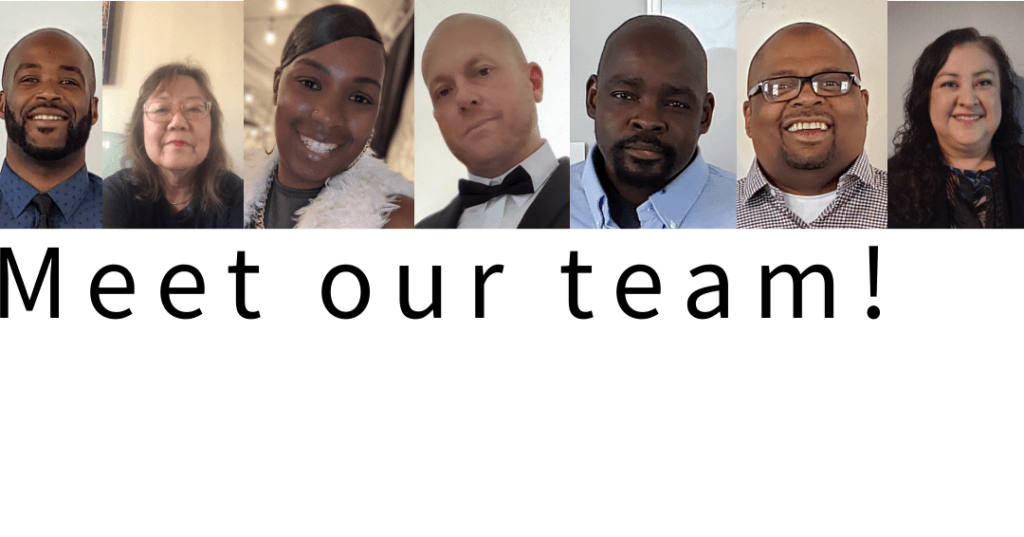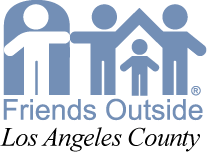Author: Mary Weaver
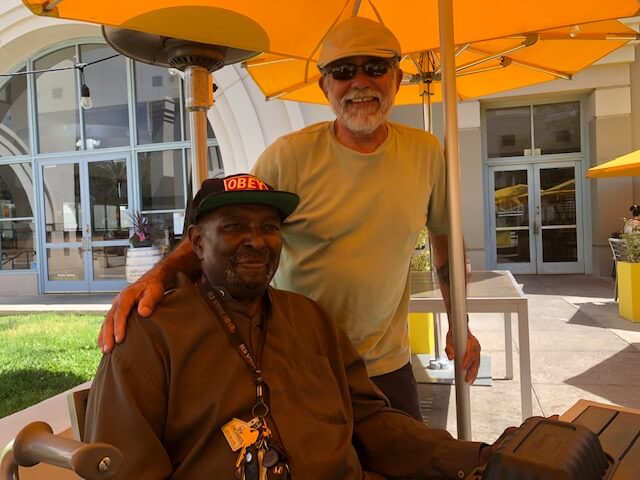
TRIBUTE TO SAMUEL SPICER, JR., 1953 – 2022
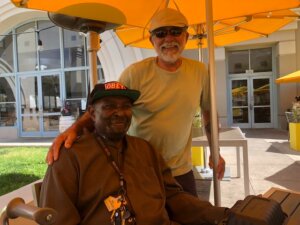
Friends Outside in Los Angeles County Case Manager, Samuel Spicer, JR., 1992 – 2008
I was quite saddened to hear of the unexpected death of Sam who was special in many ways. A colleague once told me that Sam had the best people skills of anyone she ever knew. And, that was where the specialness began.
Sam’s family moved from Mississippi to Los Angeles when he was young, such was their fear that a little black boy would not grow to adulthood in the deep South. Perhaps that is why Sam was so much in tune with people’s suffering. He told me how he would drive down Century Boulevard on his way to his office in Watts, often followed by a string of cars. No, he wasn’t giving out dollar bills. People were after that rare commodity of kindness, patience, and genuine intentions to help them. Sam declared to me that we had to start an employment program for parolees. I said, “They already have that service in the parole offices.” He responded that they helped parolees find employment but that they were not helping them prepare for employment. That conversation resulted in the creation of our re-entry employment program, the oldest one of its kind in LA County. A few years later, Sam said to me in a distressed voice, “We have to do something for the fathers coming out of prison. They are so desperate to find their children that they are looking for them under bridges!” That conversation resulted in the creation of our largest program, the Dads Back! Academy. Not many people can see a need and know how to fill it. But Sam did.
Our Founder Martha Jane Dowds loved him deeply, too. Her son Curtis told me about their last visit with Sam. Martha Jane’s voice was weak from post-polio syndrome and years of use. Sam’s voice was weak from a debilitating stroke. As they were parting ways, Curtis was helping Martha Jane maneuver her wheelchair over the bumpy sidewalk and uneven grassy strip in the parkway between the sidewalk and the curb. As Curtis tells it, “Sam saw the problem of getting mom in the car, picked her up in his arms, and gently deposited her in the passenger seat of the car. It was such a beautiful gesture.”
I appreciated Sam for the talents he brought to FOLA. But, for most people, I think it was something different. It is said that “People don’t remember what you did. They remember how you made them feel.” Even though he has not worked for Friends Outside LA since 2008, I am asked at least two or three times a year “Whatever happened to Sam? ” When I saw him for the final time earlier this year, I teased him that I would be long gone and forgotten but that people would still be calling the office and asking, “Whatever happened to Sam?” And, I meant that with nothing but admiration.
Mary Weaver
Executive Director,
Friends Outside in Los Angeles County
A Conversation with Cheryl Cromwell

Mary: Tell us about yourself.
Cheryl: I have a master’s in social work from Bryn Mawr College with a specialization in community organizing and social planning. I’ve taught in schools of social work at several institutions, served as the Director of the Office of Community Services, Department of Veteran and Community Services, for the State of Florida, and was the Assistant Director of the Kellogg Training Center at United Way in Los Angeles. I have had a consulting practice since 1986.
Mary: In what capacity did you work with Friends Outside in Los Angeles County?
Cheryl: I served as a consultant from 1999 to 2020. My work included program planning, proposal writing, strategic planning and board development
Mary: How was FOLA funded then?
Cheryl: I met the Executive Director, Mary Weaver, at a City of LA-sponsored workshop where I was a presenter. Mary approached me afterward. I wasn’t aware of Friends Outside but was interested because I had family members who might have benefitted from such a program.
Mary: How did you get involved with FOLA? Why did you get involved?
Cheryl: I think there is greater awareness about the criminal justice system, such as the costs of incarceration and the questionable efficacy of incarceration. Long sentences, Three Strikes, systemic racism, equipping people for release, and rehabilitation are now common topics in public discourse.
Mary: You were a consultant for FOLA for 21 years. How have you see FOLA change?
Cheryl: FOLA has grown significantly, programmatically and fiscally. The field of re-entry has progressed and is requiring more professionalism. And, FOLA has responded by bringing on more staff with college-level education in social work and human services. The employment program has been a huge success, FOLA has expanded its service sites, and now has major federal grants.
Mary: What do you think were your biggest contributions to FOLA?
Cheryl: My greatest contributions were to improve the quality of the proposals by adding information from literature reviews regarding best practices and researching demographic and other data to document the need for FOLA’s services. I also encouraged FOLA to “think bigger” by pursuing larger grants, including federal ones.
Mary: How do you hope FOLA continues to evolve over the next 20 years?
Cheryl: I’d like to see FOLA:
- Expand services to other areas of LA County and reestablish services in Long Beach;
- Provide gender-specific services for reentering women.
- Offer more inter-related services within a geographic area so that there can be a “layering” of services, e.g., integrate the after-school program into the fatherhood program.
- Increase administrative staffing.
- Have a data collection and tracking systems across programs.
- Increase collaboration with mainstream child and family services and child development providers.
Mary: Anything more you would like to add?
Cheryl: The services FOLA provides are very much needed. There is more interest in re-entry services at all levels of government – a recognition that people who are incarcerated do come back to the community. I hope FOLA will continue to be a leader in the re-entry field for many years to come

Honoring a Hero, Samuel Spicer, Jr., and reflecting on his contributions to FOLA
As he will readily tell it, Sam Spicer, Jr. had been in and out of jail/prison a few times when he came to Friends Outside in Los Angeles County to perform community service.
What was immediately apparent was Sam’s passion, cooperative spirit, and his desire to learn. After completing his community service, I hired Sam, who worked for FOLA for 15 years, 1992 – 2007, during which time he also obtained a Bachelor’s and Master’s Degree.
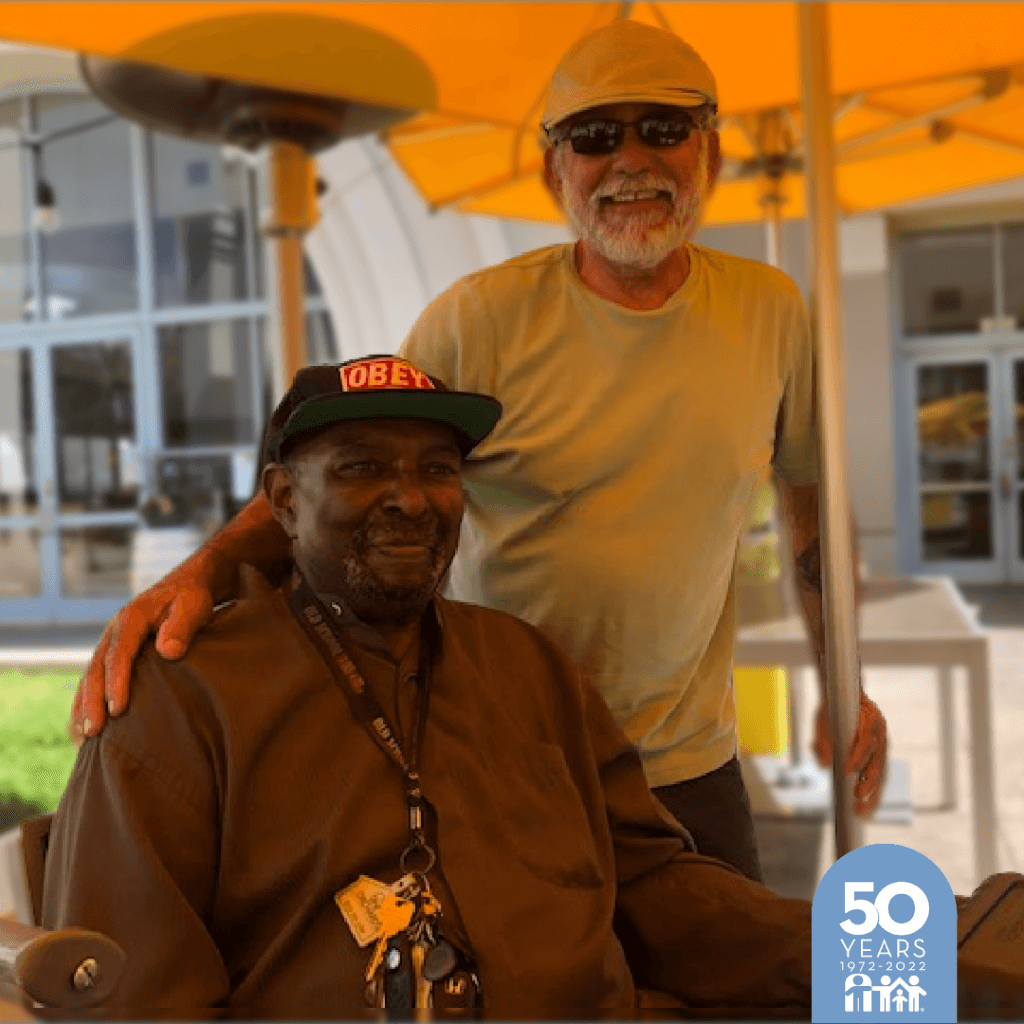
Sam has great people skills and good instincts about what kinds of services are needed by those we assist. He was instrumental in the development of our re-entry employment program and facilitated our first fatherhood support groups for persons with criminal records.
| From left to right: Former FOLA Staff, Samuel Spicer, Jr., Martin Sosa |
After leaving FOLA (in body but not in spirit!), he became a counselor at a Headstart program. Although estranged from the mother of his son, Sam always fought to maintain a relationship with his son, who is now himself married, making Sam a very proud grandfather!
We are honored to have a long-standing relationship with Sam, beloved by the community and his colleagues and a man who made deep footprints in our 50-year history!
Thank you Sam!
Mary Weaver
Executive Director
Friends Outside in Los Angeles County
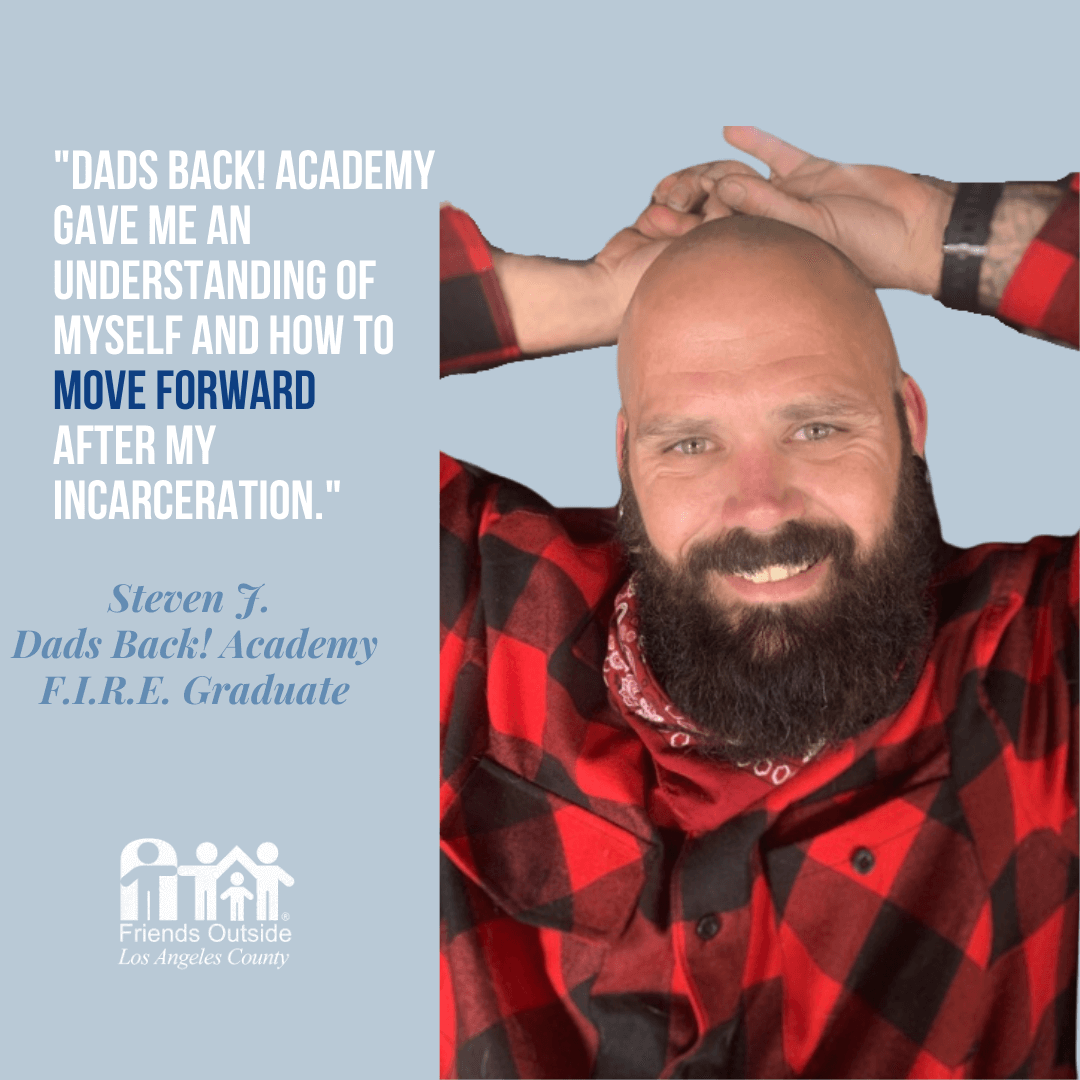
Program Highlight: Dads Back! Academy F.I.R.E.
The Friends Outside in Los Angeles County’s Dads Back! Academy F.I.R.E. program is our third-generation program designed especially for re-entry fathers, their families, and their children.
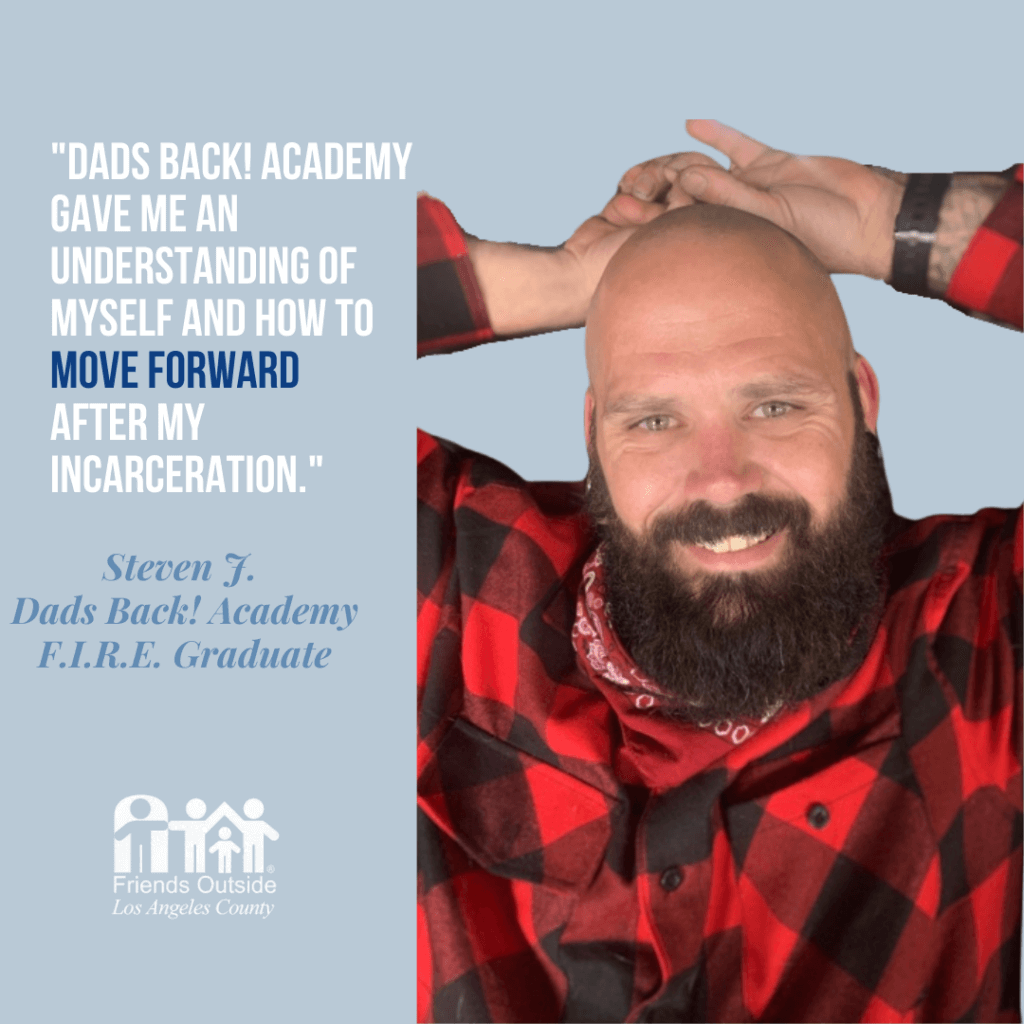
The program serves re-entry fathers who have children who are ages 24 and younger, including men who are “like a father” to children in this age group. The Dads Back! Academy is an intensive program during which fathers attend 73 hours of mandatory workshops over a one-month period in parenting/fatherhood, economic stability, and healthy relationships.
The fathers go through the workshops with other re-entry fathers. The fathers can also attend optional workshops such as in computer basics, domestic violence, and financial literacy. On completion of the workshops, program staff assists the fathers to seek and obtain employment, continue to build their relationships with their children and other family members, and pursue other desired goals.
The “Why”: Children who have been raised in families affected by incarceration most likely have experienced various levels of trauma, including possibly having witnessed the parental arrest.
In LA County, at least 75,000 children have an incarcerated parent (Kidsdata, 2018).
Re-entry fathers face unique challenges, yet resources in Los Angeles County that specifically serve these fathers are very limited. In fact, there are no other known reentry-tailored fatherhood services in the County. Our workshops were designed specifically for these fathers, offering content focused on the role of fathers and the impact of parental incarceration, toxic stress on children and brain development, co-parenting after incarceration, and other reentry fatherhood-specific issues.
Know someone who might benefit? Contact the Program Manager, DaJohnai Vincson, at dvincson@friendsoutsidela.org, for more information about the program including how to be enrolled!
